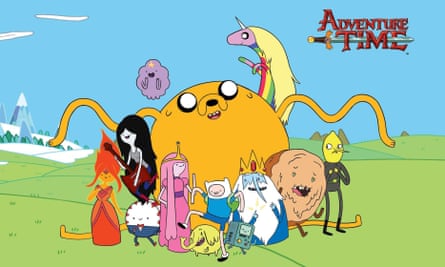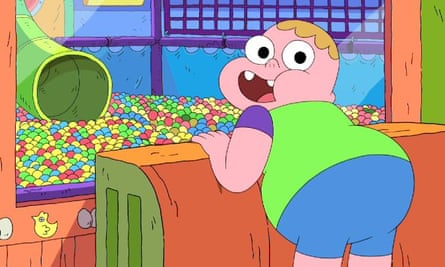The Cartoon Network show Steven Universe has a lot going for it. Created by former Adventure Time storyboard artist and songwriter Rebecca Sugar, it centers on a family composed of three intergalactic aliens (Gems) and their half-human, half-Gem surrogate son Steven. Like Adventure Time, it’s lovingly animated and scored. And its fans have followed it through an erratic airing schedule that now largely consists of intermittent blocks of five episodes, dumped all at once in a week. (The most recent of these, called Steven Bombs, wrapped up on 8 January.)
But the most powerful thing about Steven Universe might be the fact that it’s not just a great kids show – it’s one of the most unabashedly queer shows on TV. This subtext is most often conveyed through the process of fusion, in which two Gems become one as a way of both combining their power and experiencing a new mode of being. Garnet, one of the main Gems, is revealed to be a fusion between Gems Ruby and Sapphire – literally the embodiment of a romantic relationship between two women. When fans questioned the nature of that connection, executive producer Ian Jones-Quartey wrote on his Tumblr, “They are two cute cartoon characters and they are in love. Why wouldn’t that be allowed on a kids show?”
That might be a question best addressed to Cartoon Network UK, which censored one of the show’s more explicitly gay moments. The network edited the episode We Need to Talk to remove an intense moment when Pearl, one of the Gems, aggressively embraces Rose Quartz (Steven’s mom), playing up their closeness as a way of making Greg (Steven’s dad) jealous.
The network said in a statement: “The US broadcast system requires that shows are marked with a rating– in this case PG (parental guidance necessary). In the UK, we have to ensure everything on air is suitable for kids of any age at any time. We do feel that the slightly edited version is more comfortable for local kids and their parents.”

The decision is made more puzzling by the fact Cartoon Network is incredibly progressive in so many other ways. The rest of Steven Universe, which is very, very gay, continues to air, as does Adventure Time, which has teased out the simmering romantic history between Princess Bubblegum and Marceline the Vampire Queen. Meanwhile, Clarence features an out lesbian couple as parents.
A spokesperson for the network also pointed out that Cartoon Network UK had censored a heterosexual kiss between two human characters in the episode Island Adventure as well. So it appears it’s physical intimacy between two people that sets off the censors, rather than the possibility that those people are the same gender.
Still, it’s difficult not to read the show’s queerness into the edges of the sanitized space created by the phrase “more comfortable”. It might be that anything this sensuous wouldn’t make it on the air, but it’s a much bigger problem for queer relationships, particularly when even the most prominent gay characters on TV barely get to display physical affection. Culture writer Jake Pitre notes that “kids’ shows consistently downplay physical intimacy among queer couples”.
And even if there are ostensible reasons for editing out the Rose-Pearl dance that don’t relate to the participants’ gender, it slots neatly into the history of American kids shows censoring queerness for foreign audiences. Adventure Time has been forced to keep its depiction of Princess Bubblegum and Marceline’s relationship less than explicit. Nickelodeon’s The Legend of Korra faced a similar “limit” in its depiction of a lesbian relationship which couldn’t move beyond hand-holding.
It’s impossible, then, for the network to fully extricate itself from that broader context. Carli Velocci, a bisexual Steven Universe fan who has written about the show’s queerness, says, “The show’s queer fanbase is upset about this because, as a community that struggles with representation, it feels like they’re being ignored and erased.”
Cartoon Network UK’s justification for the change is, in part, this: it doesn’t have specific program ratings the way the US does, so everything on the channel must be “suitable for kids of any age at any time” (this is why the network can’t show any programming from Cartoon Network’s late-night block, Adult Swim). Though the network has to work within the standards set by Ofcom, the regulatory body overseeing television in the UK, it ultimately makes its own decisions about what it thinks will be deemed or considered acceptable.

So set aside the many reasons fans could be upset by this censorship – that the characters are important to viewers, that later episodes rely on details established earlier on, or that it’s unfair to the artists who invest so much time and energy into considering how children will experience their work. (No one on the Steven Universe production was available to comment).
Rather than exclusively, or even primarily, blaming the network, maybe we should look at what we expect from children’s television, and what it means to consider something “appropriate” for children in 2016. “Art is such a powerful way to learn empathy, so to dress this up as protecting them sounds like something from the 1950s,” Pitre says. “It is a common political sentiment to hear, “How will I tell my kids about this?” and that attitude bleeds into our children’s entertainment, even though that could be how you tell them.”
There’s exactly one good reason a parent would want to control their child’s entertainment: love. You love your child, and want the best for them. And that’s what Steven Universe is all about. Steven Universe teaches that love requires emotionally honest and open conversation. It teaches that love can be big, and that one person’s love can come in many different forms, from friends to family to significant others. It teaches that love doesn’t just magically happen at first sight, without even knowing the other person. (This is, frankly, a more mature lesson than most adult entertainment.)
Above all, it teaches that love is strong and powerful. Its relationships are gay, they’re straight, they’re between two Gems, two humans, and one of each. The important thing is that people, no matter who they are or what planet they’re from, know how to love, and that they know how to love powerfully and well. What better lesson could you possibly teach your children?

Comments (…)
Sign in or create your Guardian account to join the discussion